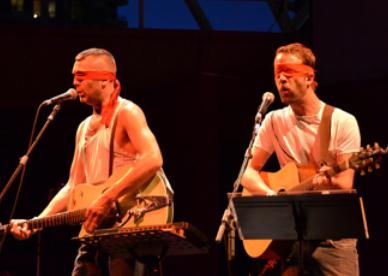
The Hidden Cameras perform in Toronto on July 1. Credit: Andrea Houston
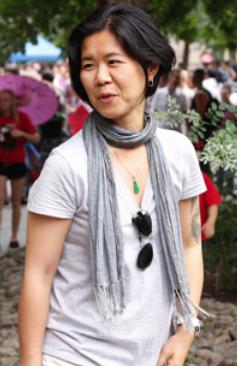
Kristyn Wong-Tam participates in the Trans March. Credit: Kyle Lasky
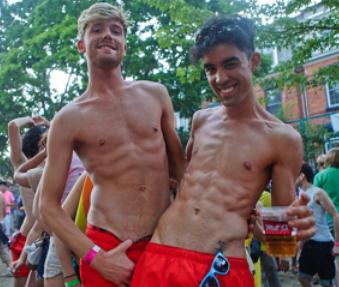
Drinking and partying at the 519 Green Space. Credit: Adam Coish
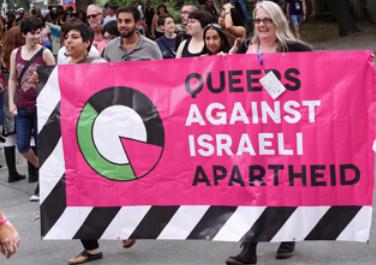
QuAIA participates in the Trans March. Credit: Kyle Lasky
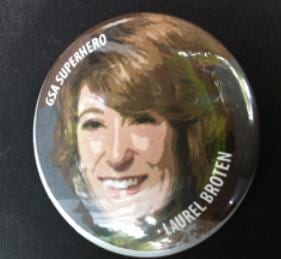
Credit: Kyle Lasky
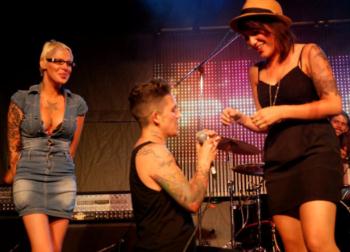
Lucas Silveira proposes to his girlfriend, Skye Chevolleau, during a Pride performance. Credit: Courtesy of Lucas Silveira
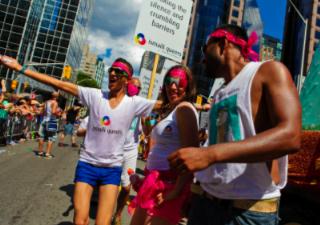
Ismaili Queers marched in the Toronto Pride parade for the first time. Credit: Adam Coish
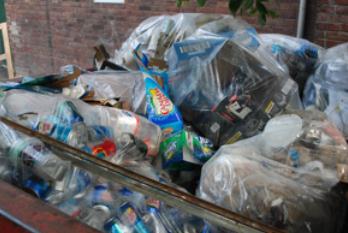
The BIA says Church St was left piled with garbage and covered in grease. Credit: Andrea Houston
Trans March route
Ward 27 Councillor Kristyn Wong-Tam says she plans to push for the official Pride Toronto Trans March to take Yonge St in 2013.
“I would love to find a way to create the conditions where the Trans March can march down Yonge St, so they can stay unified. It’s not lost on me that when the Trans March is split up into two marches, it doesn’t have the same type of visual clout,” she says.
For the past two years, Trans March organizers, both official and unofficial, have pushed for the march to go down Yonge St, like the Dyke March and the Pride parade.
This year, PT executive director Beaulieu told Xtra that he is not opposed to moving the march to Yonge St in the future. “[The Trans March] is on Friday night. There are some logistical issues with the road and traffic, so we work with the city to try and find a time and a place that’s safe and a location where it can be put on successfully.”
Wong-Tam says she will start to reach out to the trans community and PT to find a way to shift the route off Church St to Yonge St.
Activist Christin Milloy, who organized the “unauthorized trans march” immediately following the official march, says she is pleased to hear that.
If traffic concerns from Toronto police are the obstacle, Wong-Tam says, she’s confident there will be a way to work around that. “Maybe that is having a night march after rush hour that begins at 8pm. It’s still bright out.
“I said to Kevin, let’s give the trans community what they need, which is a march down Yonge St, and that’s what we should provide.”
Hidden Cameras at Harbourfront
If you weren’t too hung-over, the free concert by Canadian queer rockers Hidden Cameras at Harbourfront was the perfect way to relax Sunday night after a Pride party weekend.
The show was a fitting salute to Toronto’s Canada Day weekend. A handful of fans got up and danced in the aisles. Others waved both rainbow and Canada flags.
The Hidden Cameras, whose music is often described as “gay church folk,” are a powerhouse ensemble of horns, vocals and strings headed up by gay indie musician Joel Gibb.
The sprawling 11-piece ensemble included a six-member choir. At one point, members of the band leapt into the audience and kept playing.
Although the band has been active since 2001, its live gigs have become a rarity since Gibb moved to Berlin almost seven years ago. This summer marks the group’s first Canadian tour since releasing Origin:Orphan, their acclaimed fifth CD, in 2009.
The band will headline Westfest 2012 in Ottawa.
The Hole-y Army
The Hole-y Army art project, made up of 103 elaborately crafted vagina puppets, was an explosion of sex and colour at the front of Saturday’s Dyke March.
The army, a large-scale community project involving textiles and performance, first premiered at New York’s Dyke March – which celebrated its 20th anniversary this year and attracted 20,000 people – says Canadian artist Coral Short, who is based in New York.
The puppets were created by Short with choreography by Brooklyn’s Ariel Speedwagon, who also served as the drill sergeant. Short came up with the idea about a year ago and started making the puppets in January.
“I went to my first Dyke March in New York last year and I just thought the march needed more art, and I thought I would do a project with trans inclusion, because there is still that issue in the marches,” she says. “The army is about dykes past, present and future, as well as part-time dykes, which is bisexual, pansexual, queer dykes.”
Short says some marchers in New York are still resistant to trans inclusion. “[Marchers] get asked, ‘Do you belong here?’ Many of my friends don’t go . . . There’s some second-wave feminists who really don’t like trans women.”
So she created an army of vagina puppets, all unique, colourful, beautiful. All women, all genders. “So it’s really great we were there and vocal, and we made this huge radical queer space in New York.” That’s the message, she says: “We all belong here.”
Toronto’s Dyke March was very different, Short says. “We didn’t have the same issue in Toronto. Here people were more open-minded. Canada is more open-minded.
“The Dyke March is a protest march, and in Toronto it really was this year . . . It was a beautiful sight to see.”
WorldPride problems
Wong-Tam was saddened to hear news of the downscaling of London’s WorldPride and says she vows not to let the same thing happen to Toronto.
“I am committed to Pride Toronto and all our community partners to ensure we don’t just host a satisfactorily okay WorldPride. I want us to set the benchmark for WorldPride. WorldPride is a fairly new institution, and I want to do the best job possible.”
Wong-Tam notes this is an opportunity for the City of Toronto to promote its LGBT community and promote the city to the world. “I don’t want to squander that opportunity.”
At the 11th hour before the start of WorldPride, London city politicians called emergency meetings to try to salvage the international festival, which will no longer feature cars or floats during the July 7 parade, won’t have any official events in the gay district of Soho, and will have a more time-constrained rally at Trafalgar Square.
Councillor Shelley Carroll on Pride
Like Councillor Wong-Tam, Councillor Shelley Carroll thinks the parade was less corporate this year than it has been recently.
“I noticed that the whole thing felt more organic. Walking through the Pride Village — and while there were still products being sold, it was a little less shameless.”
Competing Pride and Canada Day parties probably did affect the numbers, she says. Carroll participated in both the Pride parade and the Dyke March.
“It likely reduced the overall number of local people coming down. There was still lots of fun, and I met many out-of-town people, but in terms of community numbers, I think that was probably down a bit.”
Carroll says this is just fine. A great city has a vibrant culture, and that includes many festivals and events every weekend.
“That’s what you want. That’s what makes people decide they could not live anywhere else. They want to live here and work here and all the rest of it. That’s a good thing.”
Queers Against Israeli Apartheid booed
Local activist Nedal Sul says he was hit with a water bottle and booed while marching with Queers Against Israeli Apartheid (QuAIA) during the Pride parade.
Sul wrote on his Facebook, “Marching with QuAIA consisted of water bottles thrown at us, booing, middle fingers, sudden outbursts and some trying to overpower our voices with sirens but we combat all of that with more chants, more peace signs, more dancing and more resiliency! Apartheid, you can’t hide anymore no matter how hard you try to cover your shit up.'”
Sul says other people yelled at QuAIA marchers and gave them the middle finger.
“Yup, all the things I wrote on my status happened. Someone threw whatever was left of her water bottle then the actual bottle at me while the police were there and didn’t do anything. Another friend in the group told me that they were also hit by a water bottle. After that, there was a group from the crowd who booed their lungs out.”
At one point, Sul says, a woman, “turned on loud sirens from her microphone until we passed.”
“However, the support definitely outnumbered the rage, with a lot of people cheering for us. I just found it interesting how enraged some were and their immature reactions.”
QuAIA member and marshal Tim McCaskell says he didn’t see anyone throwing water bottles. There were about 150 that marched in the QuAIA contingent. “It’s hard to tell. Everyone claps during Pride.”
“A couple people screamed at us, told us we should go and do this in Gaza, but nothing like last time, where we had to get the [Jewish Defense League] escorted out of our contingent three or four times,” he says. “There were a couple boos, but generally the reception was very warm.”
McCaskell says QuAIA was “quite far away” from Kulanu’s contingent.
The panel dismissed a complaint from the League for Human Rights of B’nai Brith Canada.
Laurel Broten buttons
Queer Ontario vice-chair Casey Oraa says he is insulted by buttons distributed at Toronto Pride that refer to Education Minister Laurel Broten as a “GSA Superhero.”
“The youth are the heroes,” Oraa says. “They are the ones who led the charge.”
Gay-straight alliance student activist Leanne Iskander says she saw the buttons but has “no comment.”
The Ontario Women’s Liberal Commission (OWLC) created the buttons, says president Amy Carroll.
“The buttons were handed out to volunteers walking with the Liberal Pride parade float and to people attending the parade,” she says. “They were a surprise hit, so we will definitely be looking into making even more buttons next year.”
Carroll says the idea came from a brainstorming session.
“Buttons featuring Laurel Broten were a natural fit for us. She is a strong female politician who took a principled stand on an important issue. We think her leadership on GSAs is reflective of the sort of legislation that progressive women can be effective advocates for.”
But Oraa disagrees.
“The Liberals were forced to take a principled stand,” he says. “They didn’t want to see their bill die. The youth who will continue to fight are the real heroes responsible for getting this bill in place because they kept the issue alive.”
While the button may have been well intentioned, Oraa says, it is “disrespectful to the history.”
“There seems to be an active campaign to rewrite the history of this bill,” he says. “The Liberals knew about the students and the ban on GSAs in Catholic schools for over a year and they refused to take action. Willful inaction.”
Lucas Silveira proposes at Pride
Onstage, in front of thousands of people at Toronto Pride, Lucas Silveira, frontman for The Cliks, got down on one knee and proposed to his girlfriend, Skye Chevolleau.
Silveira says he’d been planning the big moment for months. He decided he would ask Chevolleau, who is also a singer, to join him onstage for a duet. “She’s really shy, but after thinking about it she said, ‘Okay.’ I just knew I needed to get her onstage.”
In the hours leading up to the show, Silveira says, he was nervous. “It was nerve-wracking! Which was weird because I don’t usually get nervous before a show. I couldn’t hide it from her.”
Somehow he managed to keep it a secret. The couple’s mutual friend Lexi Tronic was in on the plan and passed the ring to Silveira onstage. Chevolleau’s family was watching. Her mom was in tears.
“Skye had this look on her face like she didn’t quite understand what was happening,” Silveira says. “So I just got down on one knee, looked up at her. She started to cry and put her hands all over her face. The crowd went wild, and, like a gentleman, I asked her if she would marry me.”
Her answer? “Fuck yes.”
Silveira says he hasn’t stopped smiling.
“I have this huge smirk on my face that I haven’t been able to get off,” he says. The couple has been together for one year.
Silveira’s only regret is that his parents couldn’t be there to witness the moment, because they live in Portugal. “But they knew it was happening and they love Skye. This is just awesome. I feel awesome.”
His desire to tie the knot has surprised Silveira. “I’m not necessarily anti-marriage, but I always thought it wasn’t for me. After meeting Skye, something inside me changed. I don’t know what it was. Maybe when you really find somebody that you can see as a partner for the rest of your life, something inside of you changes . . . I dunno. I love the crap out of her.”
Ismaili Queers
For the first time ever a contingent of Ismaili Queers (IQ) marched in the Toronto Pride parade.
Ismaili Queers: Advocates for Pluralism, a community group of LGBT-identified Shia Ismaili Muslims, say they were following the leadership of other Muslim community groups like Khush, ASAAP and Salaam.
The theme of their first float was Love: Connecting Ismailis of Many Ancestries.
There are Ismailis throughout the world with many different cultural roots, a news release states. “It’s a community comprised of South Asian, Middle Eastern/Persian, Central Asian, and East African influences. This plurality was reflected in the Pride attire and float decor.”
IQ, which formed in 2008, aims to create visibility and advocate for inclusion and acceptance within the greater Ismaili and queer communities and to provide a safe space for Ismaili queers, regardless of their comfort with being “out” in the general public.
During the Toronto Pride parade, spectators cheered and marchers chanted, “Allah is my ally” and “Marching for those who can’t.”
Dirty sexy Church St
It seems Pride Toronto threw a mega-party on Church St and left the local business association to clean up the mess.
David Wootton, from the Church-Wellesley Village BIA says that once Toronto’s party wrapped up, the Pride board hopped on a plane to the United Kingdom for London WorldPride, leaving behind a very dirty gaybourhood.
“Many members felt the street was left covered with grime and there were large grease patches on the sidewalk. The city told us they will clean the sidewalks for us.”
The city had to send power-washing crews to the Village to hose everything down.
Councillor Wong-Tam notes that the $300,000 worth of in-kind services provided by the city covers road closures, police and garbage clean-up services. It does not cover power washing.
Wootton estimates that the cost of the cleaning ranges from $16,000 to $23,000. “The bill will go to Pride,” he says.
But instead of getting angry, Wootton just shrugs it off. “We were discussing whether to do another street clean, then this came up, so if Pride can take care of it, that’s great.”
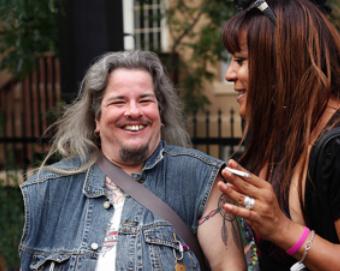
 Why you can trust Xtra
Why you can trust Xtra


